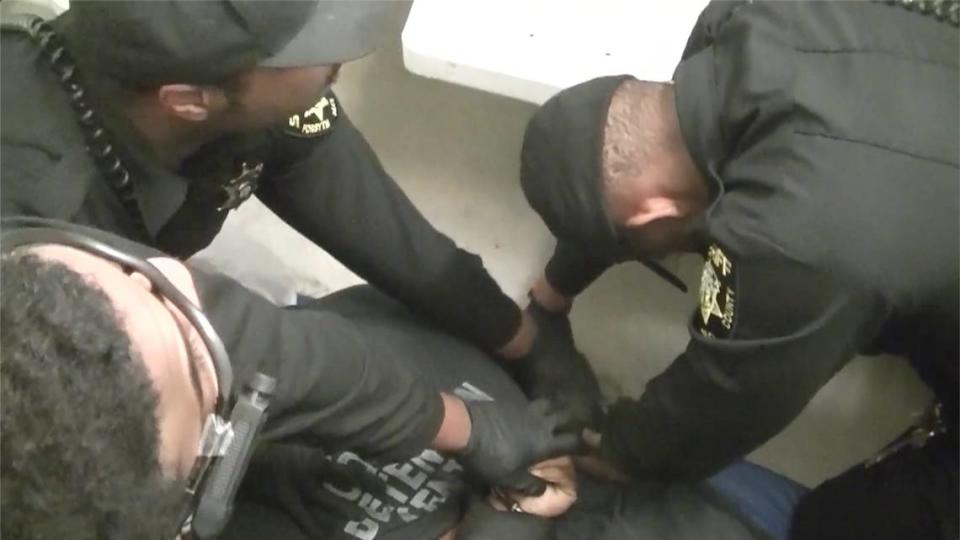DA dismisses charge against nurse in jail death of John Neville
The Forsyth County District Attorney’s Office has dismissed an involuntary manslaughter charge against a nurse who had been indicted in the jail-related death of John Neville in December 2019.
Michelle Heughins, a nurse at the Forsyth County Jail, had been charged with involuntary manslaughter in Neville’s death.
“The rights of victims in North Carolina are a primary concern of the prosecutor’s office,” the district attorney’s office said Friday in a statement.
“The victims in this particular case are the surviving family members of John Neville,” the district attorney’s office said. “The family members have expressed their wishes as to the desired outcome for the criminal case: They have asked that the remaining criminal charge against Ms. Heughins be dismissed.”
The office of District Attorney Jim O’Neill further said, “the oath of the district attorney requires we pursue justice, not vengeance. Justice in each individual case must be measured on its merits.”
Neville, 56, of Greensboro died at Atrium Health Wake Forest Baptist Medical Center on Dec. 4, 2019, a few days after he was taken into custody and brought to the jail on a misdemeanor assault charge out of Guilford County.

Neville’s death prompted local protests and a 49-day occupation of Bailey Park led by Triad Abolition Project.
Heughins’ case had been pending in Forsyth Superior Court.
Heughins was also the only remaining individual defendant in a federal lawsuit filed by Sean Neville, son of John Neville and the executor of John Neville’s estate. The lawsuit’s civil claims against Heughins and Wellpath LLC, the former health-care provider at the Forsyth County Jail, were dismissed in early July.
A $3 million settlement was reached with the detention officers, Forsyth Sheriff Bobby Kimbrough Jr. and Forsyth County.
The children of John Neville are aware of the facts and evidence learned by investigators in connection with Neville’s death, the district attorney’s office said.
In addition, the Neville family members’ attorney wrote a letter to O’Neill, expressing their thanks and their wishes that this case no longer go forward with any criminal prosecution, the district attorney’s office said.
“The family of John Neville has specifically stated that they do not wish to see any further coverage of their father’s death in the press,” the district attorney’s office said.

At 3:25 a.m. on Dec. 1, 2019, Neville, a father of five children who worked in construction, was booked into the Forsyth County Jail. Kernersville police had arrested Neville on an outstanding warrant for misdemeanor assault on a female.
While he was being booked, Neville told an intake jail official that he had asthma, the lawsuit said. A form from Wellpath showed that the jail medical provider ordered that Neville be given his inhaler four times a day — at 5 a.m., 10 a.m., 5 p.m. and 10 p.m.
That didn’t happen, and the last time Neville was able to use the inhaler was at 10:43 a.m. Dec. 1, 2019, the lawsuit said.
Almost exactly 24 hours after Neville was first booked into the jail, detention officers and Heughins went to his cell after his cellmate pushed a button. Neville had fallen from his top bunk — 4 feet from the floor — after having seizure-like symptoms. Neville was found sweating with vomit on his clothes and blood around his mouth.
The lawsuit said that although Neville was considered a special needs inmate, he was not immediately sent to the hospital. He was pinned to the floor while Heughins tried to get a pulse, and then he was handcuffed, placed in a restraint chair and taken to a multipurpose room on another floor of the jail.
Neville asked to be turned over so he could breathe. A detention officer told Neville that he was breathing because he was talking and yelling, the lawsuit said.
After three and a half minutes, Neville “uttered the last intelligible phrase he ever made,” the lawsuit said.
Another detention officer came into the room at one point and told the officers to straighten Neville’s legs. She was in charge of jail operations that night, according to the lawsuit. She made no other suggestions, the lawsuit said.
After five minutes in the prone position, Neville had stopped moving.

A detention officer asked Neville if he was OK and Neville groaned a reply. The officer took that as Neville saying he was fine, the lawsuit said.
By the time the bolt cutters removed the handcuffs, Neville had been in a prone position for 12 minutes. Detention officers removed Neville’s blue jumpsuit and left Neville alone in the prone position in the jail cell.
They went back in and started life-saving measures when Heughins noticed Neville wasn’t breathing.
Nearly 20 minutes after Neville was first placed in the prone position, Heughins started CPR, according to the lawsuit. Neville had to be revived several times both at the jail and at the hospital before he went into a coma. He was declared dead on Dec. 4, 2019.
An autopsy report said Neville died from a brain injury caused when his heart stopped and his brain was deprived of oxygen. He asphyxiated while being restrained with his arms behind his back and his legs folded up, often referred to informally as “hog-tied.”

